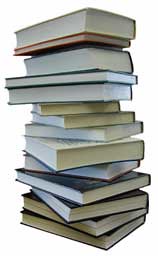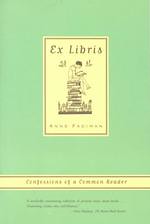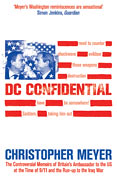 There is much talk of book lists in the air, so it seems. Lori is busy compiling her ‘must read’ list for post-dissertation mind-expansion, and Brian Sibley has compiled his top ten tomes (causing a few rejects to turn a cold spine in disgust at not making the cut). So I’ve deliberated, and here are mine.
There is much talk of book lists in the air, so it seems. Lori is busy compiling her ‘must read’ list for post-dissertation mind-expansion, and Brian Sibley has compiled his top ten tomes (causing a few rejects to turn a cold spine in disgust at not making the cut). So I’ve deliberated, and here are mine.Unfortunately I just couldn’t find a way to narrow it down to ten, and twenty seemed too many, so I compromised at fifteen. These are also not all novels, which seems to be the case for others’ lists.
A disclaimer: This list is a mixture of books I would classify as my favourites (worth re-reading again and again) and those that have influenced my life more as ‘experiential reads’. Most make it into the second category, either because they are books that ‘make you think’, or they hold very special memories of their first reading.
And to defend against accusations that the Bible didn’t make it into my ‘influential books’ list, putting the Bible in with Charlotte’s Web just doesn’t seem to make much sense. It’s something altogether different. (Plus, I tend to think that people who answer ‘The Bible’ to the question ‘What is your favourite book?’ are either completely unimaginative or trying to sound virtuous.)
Since we seem to favour alphabetical order around here, we’ll start with a suicidal crazy woman.
The Awakening - Kate Chopin
Read for the first time in college. It wouldn’t necessarily make it onto my ‘favourite books’ list, but it was one of those reads that reinforces everything I love about analyzing literature.
Charlotte’s Web – E. B. White
One of the first books I can remember treasuring. My Dad would read this--along with a large stack of Enid Blyton books--to me at night. I wanted my very own Wilbur. Any child who watches the movie instead of reading this wonderful book misses out on a world of imagination.
 Ex Libris – Anne Fadiman
Ex Libris – Anne FadimanThis collection of essays vies for the number one spot on my ‘all-time favourites’ list. If you love to read and have a passion for books, you have to read this incredible book. Anne Fadiman is the daughter of Clifton Fadiman, the writer, editor, and popular radio-show presenter. These essays originally appeared in the Common Reader column of Civilization.
The Imagineering Way – Disney Imagineers
This one is both a favourite and an experiential read. Lori and I began it in a hotel room at Disney World last summer at a time of big decisions. Figment and the ‘blue sky session’ are a true inspiration.
Jane Eyre – Charlotte Brontë
An absolute classic. What more can I say? I’ve loved this book ever since I first read it at school.
The Lion, The Witch and the Wardrobe – C.S. Lewis
One of the most incredible stories of all time (as are all the Narnia books). This was perhaps my earliest book. It’s truly beautiful. I also learnt more about Christianity from Aslan than I ever did from Anglican church services.
Nine Horses – Billy Collins
Nine Horses is just one example of this incredible poet’s work. U.S. poet laureate from 2001-2003, Collins has a style that is all his own and a skill for making the most mundane thought into a little world (see example on right-hand sidebar).
 Paris – Julien Green
Paris – Julien GreenThis is a little gem of a book by a man who creates a virtual Paris inside his mind and, in turn, presents it between the grey covers of this little volume. I particularly love the bilingual presentation: French on the left, English on the right. An all-time favourite and one of the most lyrically beautiful uses of language in prose I have ever read.
Persuasion – Jane Austen
I have a hard time selecting an Austen novel for this list, since they are all so wonderful. Pride and Prejudice should probably have pride of place here, since it was the first one I read, but Persuasion is my favourite. No one can beat Austen’s sparkling wit, and I would argue that we have her to thank for the modern novel.
Possession – A. S. Byatt
One of the most incredible novels I have ever read. Watching a movie adaptation before reading the book can be a little off-putting (no effort required for a film, whereas a book is a two-way process). This one, however, defied all expectations. For an academic there is no better book, especially a literary academic (especially especially a nineteenth-century literary academic). This is also an ‘experiential read’, bringing back memories of sitting on a balcony overlooking the beach in Seaside, Florida, last summer, watching pre-4th July fireworks in the distance.
 A Tree Grows in Brooklyn – Betty Smith
A Tree Grows in Brooklyn – Betty SmithWhen I think of this book I am sitting under a tree on an expansive green lawn in my school uniform. I am 16 and I am in the middle of my GCSE exams, on study leave, and desperate to escape from the world of revision. I sat under that tree, with the imposing old building that had been my school for 11 years staring down at me from the other end of the lawn, and found a completely different world in the pages of this incredible novel.
To America – Stephen Ambrose
Literally a love song to America, written by a historian whose experiences alone make the book worth reading. This is part history, part memoir, part exploration of a country and what it stands for… a wonderful book.
To Kill a Mockingbird – Harper Lee
Another classic. Everyone should read this novel.
Vindication of the Rights of Women – Mary Wollstonecraft
Reading this book isn’t just about agreeing with Wollstonecraft; it’s about being incredulous that anyone could disagree with her. A true insight into another world and the founding text of the feminist revolution. It’s not light reading, but it is important.
W
 ithout Reservations – Alice Steinbach
ithout Reservations – Alice SteinbachOkay, this one is perhaps the odd one out in that it is hardly a literary masterpiece. But it influenced my life in a strangely profound way. The travel narrative of a Pulitzer Prize-winning journalist from Baltimore who decides to shake up her life and travel around Europe (France, England, Italy), this was one of the first ‘travel books’ I read, and one of those books that makes you think ‘I know what kind of life I want to live’. Perhaps I’ve turned into a middle-aged woman too young, but on the other hand I like to think that I’ll live out my mid-life crisis early, so I don’t have so many regrets when I get there.
There are so many that I culled from the list… Daphne du Maurier’s Rebecca, Elizabeth Gaskell’s North and South, Vickram Seth's An Equal Music, Hemingway’s A Moveable Feast, Fitzgerald’s Tender is the Night (which will never fail to remind me of three months in France), Alain de Botton’s The Art of Travel, Wilkie Collins’s The Woman in White, Michelle Magorian’s A Little Love Song (read in a single sitting at 13), Sarah Trumball’s Almost French, Audrey Niffenegger’s The Time Traveler’s Wife (read over the Atlantic ocean)… and so many more. I suppose those are my ‘honorable mentions’.
I wonder what will happen to my list in 20 years time. How many will still be there? Even more exciting: what will be the new additions?
Speaking of books:
 Finished last week: Christopher Meyer’s D.C. Confidential – great read.
Finished last week: Christopher Meyer’s D.C. Confidential – great read.Purchased (for Lori) last week: See her post.
Purchased today (well… Dad purchased for me today, to be completely accurate): Billy Collins’s The Apple That Astonished Paris and Samuel P. Huntington’s Who Are We? America’s Great Debate.






For weeks I have been wanting to take the time to compile a list of books that are my favorite, my most influential, and my most experiential reads. Now I needn't bother. I can just reference your post instead!